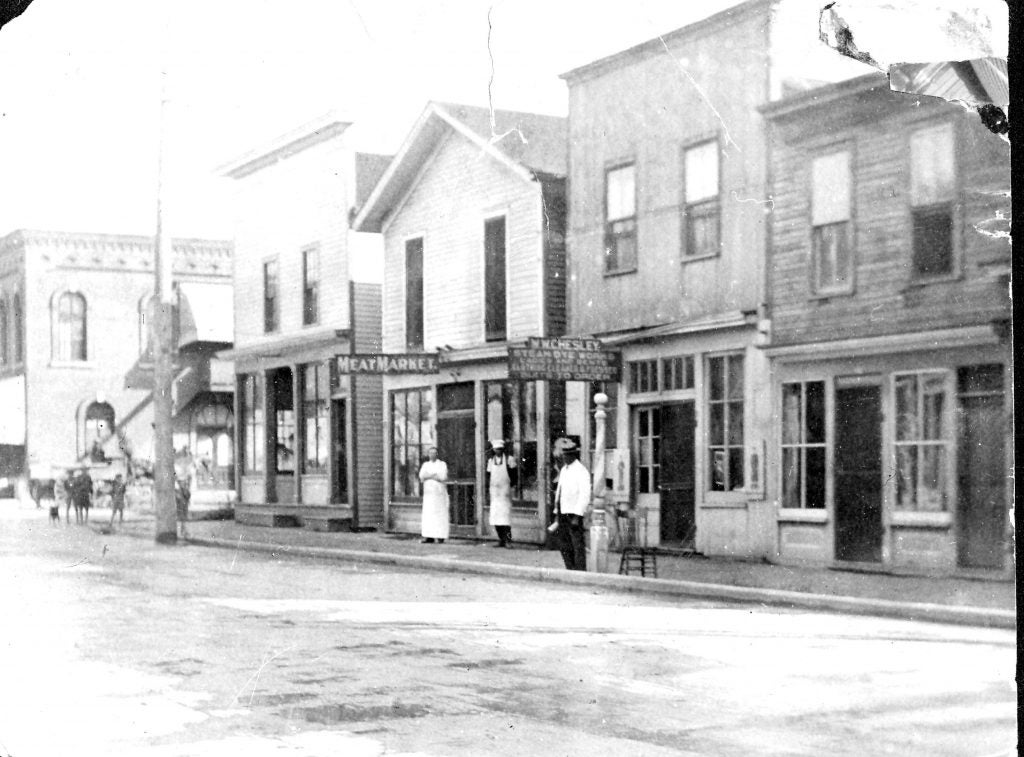Dowagiac’s favorite barber
Published 8:26 am Monday, March 6, 2017

- Thomas Jefferson Martin stands in front of his barber shop on the north side of Commercial Street in the 1870s or 1880s. (Photo courtesy of the Dowagiac Area History Museum)
One of my favorite characters in Dowagiac history is Thomas Jefferson Martin, one of the city’s first African American settlers.
Martin led an interesting life that took him from the Deep South and many stops along his journey to Dowagiac.
He was well regarded in his adopted hometown, as one Dowagiac newspaper noted in 1904, “In the person of Thomas Jefferson Martin, of this city, Dowagiac possesses one of the remarkable men of his time.”
Thomas Jefferson Martin was born in Shelbyville, Tennessee in 1820. Martin’s father was William Martin, a fairly well-to-do slaveowner. William Martin had a long running affair with his housekeeper, who had several of his children, including Thomas Jefferson Martin.
In retrospect, it is a fitting name considering our third President’s history with Sally Hemings.
William Martin granted Thomas Jefferson Martin, his mother and his siblings their freedom and, in 1832, at the age of 12, Thomas Jefferson Martin took up the barber trade in Florence, Alabama. According to Martin, he stayed in Florence until he was 21 and he recognized that the Alabama Slave Codes of 1833 “permitted the selling of a freed slave into slavery again if he stayed in the state.”
Needless to say, for free African Americans, staying in Alabama was not worth the risk. He took a chair aboard the Mississippi River steamboat the George Collier.
Martin later moved to Louisville and then to Madison, Indiana — again taking a seat on a steamboat, this time plying the Ohio River.
While in Madison, he got married and joined the Free Masons.
It was during the years in Florence and while plying the Mississippi and Ohio Rivers that Martin claims he shaved many notable Americans in history, including future presidents James Polk and Abraham Lincoln, Sen. Henry Clay and Confederate President Jefferson Davis. It should be noted that many barbers of the era made such claims — whether they are true or not is unknown, but it likely raised the barber’s street cred back in the day.
Madison was a major crossing point for the Underground Railroad. Martin’s 1912 obituary stated he was involved in the Underground Railroad during this time period.
He likely attended the city’s African Methodist Episcopal Church and worked with George DeBaptiste and other notable figures on the Underground Railroad. Martin was arrested twice for entering a slave state while in Madison, probably doing work on the Underground Railroad.
Martin was active on the Underground Railroad at the time of the Kentucky Raid, and that incident may have ultimately led him to Cass County — the incident certainly let him know that some residents of the county were sympathetic to the cause. He moved to Kalamazoo in 1854 and found his way to Dowagiac in 1855.
Dowagiac in 1855 would have had less than 1,000 residents.
The town was created in 1848 when the Michigan Central Railroad came through town. Dowagiac would have consisted of some wood frame buildings along Front and Commercial streets with residences surrounding the downtown.
Martin opened a barbershop in the young settlement — it wasn’t even a village at this time.
Martin’s stature in the city and the state of Michigan grew in the 57 years he lived there.
According to the Daily News, he was a “fluent talker and a good orator. He has spoken on many occasions to goodly audiences and his opinions have much weight.” He served as grand master for the State of Michigan in the Prince Hall Lodge of the Free and Accepted Masons, and took on politics as well.
A March 4, 1884 Dowagiac Republican article called him “the recognized leader of the colored people in the state” as he was calling for a convention for Michigan African Americans at Battle Creek. In an article titled “Mr. Martin’s Position,” Martin asked “whether the shotgun policy of the southern Democrats is to be recognized and sanctioned as a legitimate mode of political warfare.” He cited the 1876 election as evidence of the intimidation tactics used by Democrats and “now we find the same line of policy inaugurated south preparatory for the campaign of 1884.”
Martin was clearly a Lincoln Republican.
To demonstrate Martin’s stature in Dowagiac, we can look no further than the Round Oak Stove Company. After placing his heating stoves in the depots and buildings of the Michigan Central Railroad Company in the late 1860s, P.D. Beckwith knew he had a business with potential, but he needed customers and he needed to start locally.
In his first stroke of marketing genius, he placed his first stove for the market in Martin’s barbershop. Every man in town would eventually need a haircut and/or shave, so a barbershop would be the perfect shop in which to place the stove. That he placed it in Martin’s shop shows how popular he was in town — there had to be a handful of barbers active in the city in 1870.
By 1900, the Round Oak Stove Company was one of the largest stove manufacturers in the U.S., with more than 1 million stoves in use at that time. The original P.D. Beckwith stove stayed in Martin’s barbershop until 1895, when the Lee family asked for its return for placement in the Rockery on High Street. They gave Martin a new stove in exchange.
Martin kept his barber chair open into his late 1980s. A 1904 article in a Dowagiac newspaper titled “Michigan’s Oldest Barber” provided a glimpse into his life and how respected he was throughout the city. The article noted “he has regularly, day after day, been at his chair unless absent from the city, which was seldom, and he has always set an example of sobriety and love of home that others could well emulate.”
Thomas Jefferson Martin died July 1912 at the age of 92. He and his wife had one son, C. Fabe Martin.
Steve Arseneau is the director of the Dowagiac Area History Museum. He resides in Niles with his wife, Christina, and children, Theodore and Eleanor.







